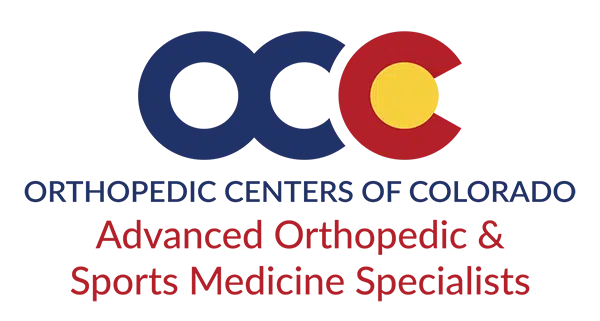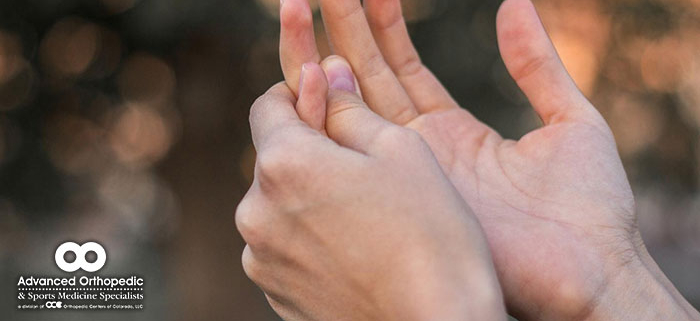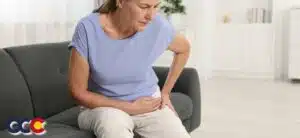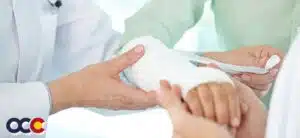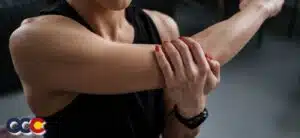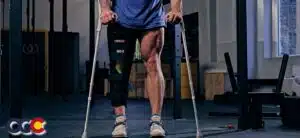Dupuytren’s Contracture is a hand irregularity that causes one or more fingers to bend towards the palm. As the condition progresses, the affected fingers can become stuck in their forward positions – impeding hand function.
Directly beneath the skin of the palm lies a fibrous layer of tissue that can thicken and form nodules within the tissue. Over time, the knots progress into rigid cords that draw the affected finger or fingers further forward to inhibit basic hand function.
There is no clear cause for Dupuytren’s Contracture, but the condition is more commonly found in older, white males from Northern European and Scandinavian descent, and patients may be known to have diabetes, drink and/or smoke. Genetics also play a role: Dupuytren’s has been observed to be hereditary.
Symptoms of Dupuytren’s Contracture
Dupuytren’s Contracture’s slow onset and progression can make it difficult to recognize early symptoms that may occur over a period of years. For example, the skin of the palm may thicken and appear dimpled months before a tissue knot is noticed or further progression occurs. Symptoms such as the appearance of cords that connect to fingers and tug the fingers toward the palm, limiting finger flexion are signs of advanced Dupuytren’s.
Dupuytren’s is not the only condition to impair finger flexion. Trigger Finger, the result of overuse or injury, can also present with a similar appearance. The difference lies in the root cause. Whereas trigger finger can affect the tendon of any finger, Dupuytren’s involves the tissue and most often impacts the fingers furthest away from the thumb.
Treatment
The severity of a patient’s condition determines which Dupuytren’s treatment is the best course of action. A patient examination will explore individual health factors and genetic history, the identification of the location and number of Dupuytren’s nodules, and assessment of overall finger flexion. Mild cases of Dupuytren’s that do not impair hand function may not require corrective action. For more advanced cases, treatments may include needling, injections, and surgery.
Needling
If multiple fingers are impaired by facia knots, your doctor may elect to use a needle to break apart the fibrous knots at the base of each affected finger to increase finger motion. Although the knots may reform, requiring further treatment, this procedure has a short recovery and can restore hand function quickly.
Injections
Enzyme injections are used to weaken thickened Dupuytren fibrous tissue to help your physician break the chords that inhibit finger movement.
Surgery
More advanced cases of Dupuytren’s may require surgery to remove the tissue rather than breaking it up. Surgical treatments may at times have longer recoveries, but they vary depending on how involved the procedure is. The two most common surgical options are fasciotomy and subtotal palmar fasciectomy.
Fasciotomies involve surgically dividing Dupuytren chords through an incision in the palm to weaken the contracture and restore finger motion. Fasciotomies are out-patient procedures that use local anesthesia.
Subtotal palmar fasciectomies target the removal of diseased tissue rather than simply weakening it through the less invasive fasciotomy. Depending on the extent of the damaged tissue, a skin graft may be needed to seal the wound. A hand splint will support recovery and physical therapy may be employed to help maximize hand function.
Individual cases determine which surgical procedure is the best treatment. Although recurrence is still possible, surgical procedures generally deliver marked improvement in hand function.
Regardless of when you notice symptoms of Dupuytren’s Contracture, your physician can confirm a proper diagnosis, assess the stage of Dupuytren’s progression and recommend the right treatment plan for you. The team at Advanced Orthopedic Sports Medicine Specialists offers comprehensive treatment for Dupuytren’s. Drs. Hurley, Worrell, and Alijani provide extensive specialized experience treating all stages of Dupuytren’s Contracture. To learn more, call 303-344-9090 or schedule an appointment.
